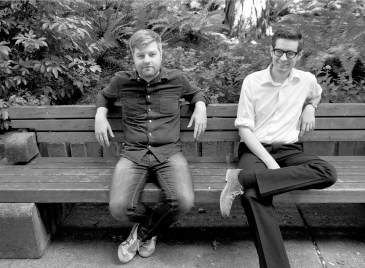
Alternatively, the title for this month’s “On the Air” could be “Sam Finally Recognizes the Extent of CiTR’s Diverse Programming.” Just when I’d started to know my way around the psychedelic post-grunge soundscape, I’m thrown into different kinds of contemplation by a conversation about the muzzling of Canadian scientists. The Terry Podcast, a weekly 30-minute documentary radio show created by Gordon Katic and Sam Fenn, facilitates this kind of conversation. I sat down with Katic and Fenn at the station to talk about where their show fits in the grand scheme of UBC’s Terry Project.
*Interview has been edited and condensed for print*
What is the Terry Project — as a whole — and where does the radio show fit in?
Fenn: There are three main components to the Terry Project. They put on a student speaker series and the TEDx talks, but the thing that Gordon and I spend our time doing is the radio show called the Terry Podcast. The goal of the show is to take a big idea generated from academia and do investigative, non-fiction journalism around that idea. We’re doing a five-part series on drug policy in Vancouver right now. We talk to researchers throughout the piece to explain these drug policy concepts — epidemiology, political science, and public health research. But then we actually go out and talk to the drug users and people on the street and try to tell the stories about how those big ideas actually impact people on the ground level.
Katic: In a way, The Four Pillars [drug policy] series that we’re doing is a perfect illustration of the kind of programming we’re trying to do because it’s a piece of policy that comes straight out of the academy. It’s study-based implementation. We look at how ideas that come out of the academy actually affect lives.
How do professors respond to being contacted for the show?
Fenn: Their response is usually really effusive. They appreciate that we can offer them something more than a 20-second media clip. We really want to fully understand the research. It’s a bigger commitment for the professor, but they appreciate it. A common thing professors tell us is that larger media outlets will just ask them the same question over and over. When they finally cave in and say something a little more provocative but a little less accurate, that becomes the clip that’ll end up being played repeatedly on the radio. I think they appreciate getting away from that.
You’re doing TheFour Pillars documentary in partnership with independent BC publication The Tyee. How did that come to be?
Katic: We were working on this documentary about drug policy and this building in the Downtown Eastside for a while. But we got scooped: the story ran in The Province before we published it. When The Tyee heard they said, “Forget the story, just do a whole series on drug policy” and I thought that was a great idea. That’s the beauty of independent media: there are no other organizations like [CiTR and The Tyee] in Vancouver that would give us space to go wherever one idea takes you. Here we can think broadly, without having to do things like daily news scoops and quick headlines.
You recently won a National Community Radio Award. Which aspect of your programming was that for?
Fenn: It was for a documentary we made last year called Sam Returns to Historymaker. Historymaker is a Pentecostal youth rally that mixes a big concert with radical Christianity. People have pivotal experiences at these things. They claim to hear the voice of God, they speak in tongues, they receive prophecy, all this crazy stuff. For a lot of these people it becomes evidence of the existence of God. I was raised in a very Pentecostal Christian denomination called The Vineyard. I rationally don’t believe in God anymore, but I remember these things happening when I went as a kid that felt completely real to me. So the plan was to take a microphone and go through the experience of this Christian conference again, to see if I would be able to resolve the tension between my atheism and my memory. We found all these modern kids living in rural BC and realized they were fascinating characters in a really interesting subculture. I think the reason why it won the award was because it was a place where most people can’t get into normally.
Where can you see the show going from here?
Katic: I hope the show becomes an example of the ways in which academia can really communicate to the general public. If we can accomplish that, then it can be an example to this university and to other universities in the future.
Fenn and Katic are on CiTR every other Thursday from 1 to 2 p.m. You can stream the Four Pillars Revisitedseries at The Tyee website or listen to any of their previous podcasts at https://www.terry.ubc.ca/category/podcast/

